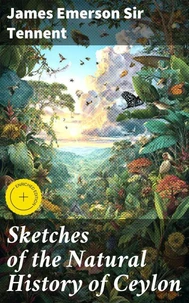The Wild Elephant and the Method of Capturing and Taming it in Ceylon. Ceylon's Elephant Whisperers: A Cultural Journey into Wild Elephants and Their Training Methods
Par :Formats :
Disponible dans votre compte client Decitre ou Furet du Nord dès validation de votre commande. Le format ePub est :
- Compatible avec une lecture sur My Vivlio (smartphone, tablette, ordinateur)
- Compatible avec une lecture sur liseuses Vivlio
- Pour les liseuses autres que Vivlio, vous devez utiliser le logiciel Adobe Digital Edition. Non compatible avec la lecture sur les liseuses Kindle, Remarkable et Sony
 , qui est-ce ?
, qui est-ce ?Notre partenaire de plateforme de lecture numérique où vous retrouverez l'ensemble de vos ebooks gratuitement
Pour en savoir plus sur nos ebooks, consultez notre aide en ligne ici
- Nombre de pages1491
- FormatePub
- ISBN406-4-06-613523-2
- EAN4064066135232
- Date de parution19/12/2019
- Protection num.Digital Watermarking
- Taille2 Mo
- Infos supplémentairesepub
- ÉditeurGOOD PRESS
Résumé
James Emerson Sir Tennent's "The Wild Elephant and the Method of Capturing and Taming it in Ceylon" is a groundbreaking exploration of the wild elephant in Ceylon (modern-day Sri Lanka), blending natural history with ethnographic observation. Tennent's meticulous account is characterized by a vivid literary style that captures the majesty and complexity of these magnificent creatures, alongside their intricate relationship with local customs and practices.
Through detailed narratives and precise descriptions, he reveals the various methods employed by native populations to capture and train elephants, set against the backdrop of Ceylon's lush landscapes and rich biodiversity. Tennent, a Scottish physician and naturalist, spent significant time in Ceylon during the 19th century, his experiences profoundly shaping his insights into the fauna and culture of the island.
His scientific curiosity and deep respect for nature prompted him to document his observations, aiming to enlighten Western audiences about the ecological and cultural significance of elephants. His work reflects his commitment to blending scientific inquiry with an appreciation for local traditions, making his observations invaluable even today. This book is a must-read for anyone interested in zoology, anthropology, or the colonial history of Ceylon.
Tennent'Äôs unique perspective not only informs about elephant captivity and management but also invites readers to ponder on ethical considerations concerning wildlife. Engaging and richly informative, this text serves as a compelling bridge between past and present understandings of human-animal relationships.
Through detailed narratives and precise descriptions, he reveals the various methods employed by native populations to capture and train elephants, set against the backdrop of Ceylon's lush landscapes and rich biodiversity. Tennent, a Scottish physician and naturalist, spent significant time in Ceylon during the 19th century, his experiences profoundly shaping his insights into the fauna and culture of the island.
His scientific curiosity and deep respect for nature prompted him to document his observations, aiming to enlighten Western audiences about the ecological and cultural significance of elephants. His work reflects his commitment to blending scientific inquiry with an appreciation for local traditions, making his observations invaluable even today. This book is a must-read for anyone interested in zoology, anthropology, or the colonial history of Ceylon.
Tennent'Äôs unique perspective not only informs about elephant captivity and management but also invites readers to ponder on ethical considerations concerning wildlife. Engaging and richly informative, this text serves as a compelling bridge between past and present understandings of human-animal relationships.
James Emerson Sir Tennent's "The Wild Elephant and the Method of Capturing and Taming it in Ceylon" is a groundbreaking exploration of the wild elephant in Ceylon (modern-day Sri Lanka), blending natural history with ethnographic observation. Tennent's meticulous account is characterized by a vivid literary style that captures the majesty and complexity of these magnificent creatures, alongside their intricate relationship with local customs and practices.
Through detailed narratives and precise descriptions, he reveals the various methods employed by native populations to capture and train elephants, set against the backdrop of Ceylon's lush landscapes and rich biodiversity. Tennent, a Scottish physician and naturalist, spent significant time in Ceylon during the 19th century, his experiences profoundly shaping his insights into the fauna and culture of the island.
His scientific curiosity and deep respect for nature prompted him to document his observations, aiming to enlighten Western audiences about the ecological and cultural significance of elephants. His work reflects his commitment to blending scientific inquiry with an appreciation for local traditions, making his observations invaluable even today. This book is a must-read for anyone interested in zoology, anthropology, or the colonial history of Ceylon.
Tennent'Äôs unique perspective not only informs about elephant captivity and management but also invites readers to ponder on ethical considerations concerning wildlife. Engaging and richly informative, this text serves as a compelling bridge between past and present understandings of human-animal relationships.
Through detailed narratives and precise descriptions, he reveals the various methods employed by native populations to capture and train elephants, set against the backdrop of Ceylon's lush landscapes and rich biodiversity. Tennent, a Scottish physician and naturalist, spent significant time in Ceylon during the 19th century, his experiences profoundly shaping his insights into the fauna and culture of the island.
His scientific curiosity and deep respect for nature prompted him to document his observations, aiming to enlighten Western audiences about the ecological and cultural significance of elephants. His work reflects his commitment to blending scientific inquiry with an appreciation for local traditions, making his observations invaluable even today. This book is a must-read for anyone interested in zoology, anthropology, or the colonial history of Ceylon.
Tennent'Äôs unique perspective not only informs about elephant captivity and management but also invites readers to ponder on ethical considerations concerning wildlife. Engaging and richly informative, this text serves as a compelling bridge between past and present understandings of human-animal relationships.



